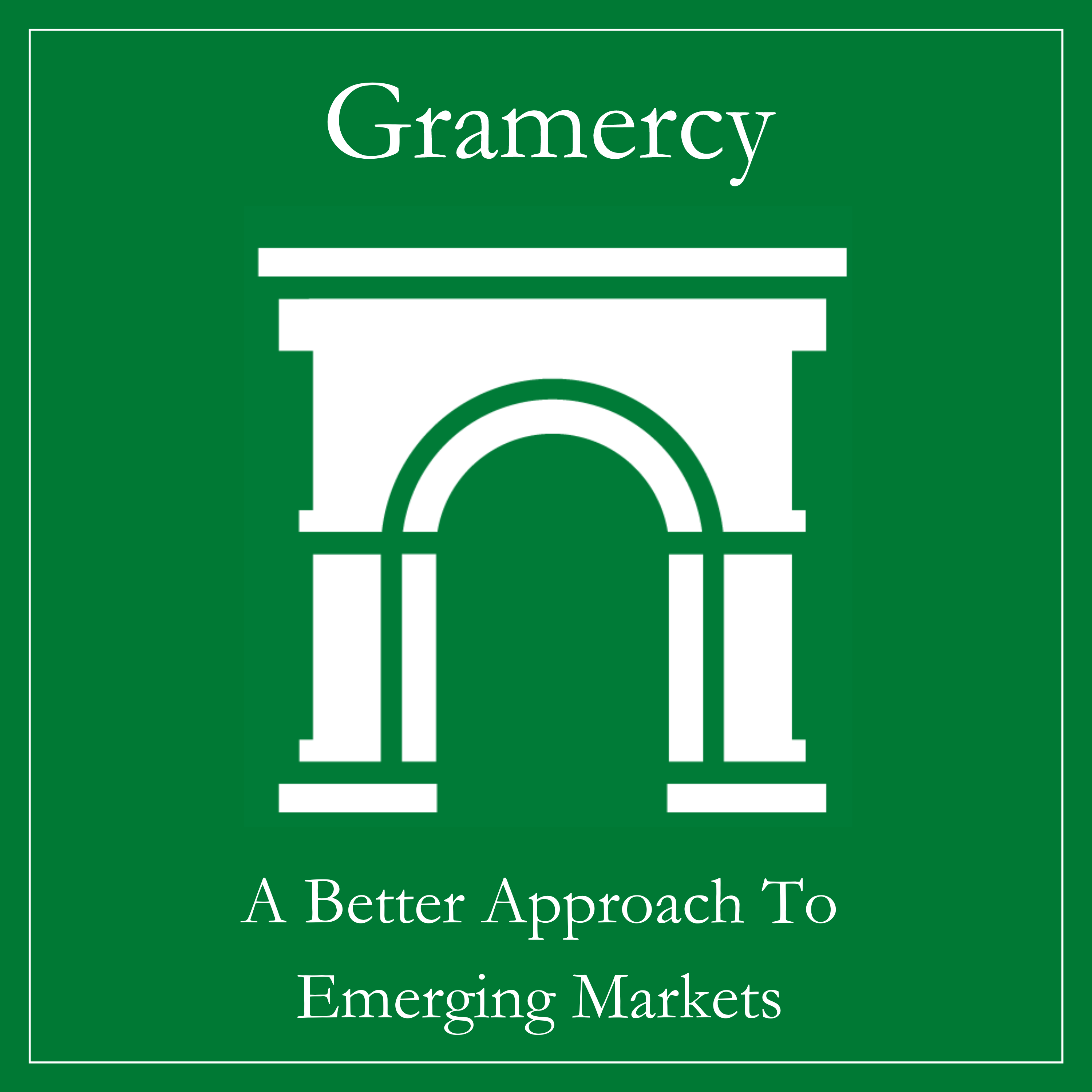Contents
Market Overview
Macro Review
The Federal Reserve stood pat on interest rates. Focus shifts to the Jackson Hole Symposium after Chair Powell’s dovish press statement, before the September interest rate decision and updated Summary of Economic Projections. A second important event over the week was when the U.S. Treasury cut its July to September borrowing estimate to $740bn from $847bn due to a slower asset runoff. The Treasury expects to borrow $565bn in the final quarter of 2024. However, the macro rate-driven event risk was primarily with the weak nonfarm payroll data and to a lesser extent with the weak ISM data. U.S. Treasuries rallied 20-25bps over the week. The Bank of Japan also tightened policy by 15bps as expected and tapered its QE program. Earnings were mixed as almost 40% of the S&P and 24% of the Stoxx 600 reported, although the news-flow supported the idea of a fast-slowing real economy. The market was also seeking more Chinese policy support out of the July Politburo. The meeting focused on faster and better implementation of existing policy support measures announced at the March NPC meeting, April Politburo and mid-May property easing measures. China’s Moutai hit another year-to-date low again, which is typically an early and pessimistic marker for the broader Chinese consumer. Instead, late in the week, geopolitical risk drove crude oil and other commodities higher but was quickly met with a soft landing narrative. For this reason and with ISM and NFP data, U.S. Treasury yields declined, the dollar weakened and the VIX spiked above 20pts. Elsewhere, South Africa’s former President Jacob Zuma was formally expelled from the ANC. Ethiopia secured a $3.7bn IMF program, just as IMF completed the third review of Egypt’s EFF which unlocked $820m. Colombia’s Finance Ministry proposed a COP523tn 2025 budget amid growing fiscal challenges, which is far higher than 2024. However, Fitch affirmed Colombia’s rating at BB+ and the Central Bank cut interest rates by 50bps to 10.75%. Brazil’s BRL was relatively rangebound over the past week, but after the Selic rate was held unchanged at 10.50% there are growing signs that the cutting cycle is over and the Copom may hike rates in September. However, the main EM spectacle of the week was Venezuela’s election, which was marred in unrest and allegations of electoral fraud.
EM Credit Update
Emerging market sovereign credit (cash bonds) ended the week up 0.6%, with credit spreads 11bps wider. Sovereign outperformers were Ethiopia, Argentina and Suriname, while Venezuela, Sri Lanka and Ukraine underperformed.
The Week Ahead
The first week of August ought to be quieter in global macro. China will publish inflation data and report slower credit growth due to seasonal factors. The Reserve Bank of Australia will deliver the verdict on interest rates, although the market anticipates an unchanged decision. German industrial production figures for June will do little to change the bigger picture. Turkey is likely to benefit from base effects in the inflation release, with expectations implying a 10ppts decline to 62%. Finally, EM interest rate decisions are limited to India (6.5%).
Highlights from emerging markets discussed below: Disputed Presidential Election plunges Venezuela into a period of significant political uncertainty, Egypt receives $820mm IMF disbursement, and Paraguay upgraded to investment grade.
Fixed Income
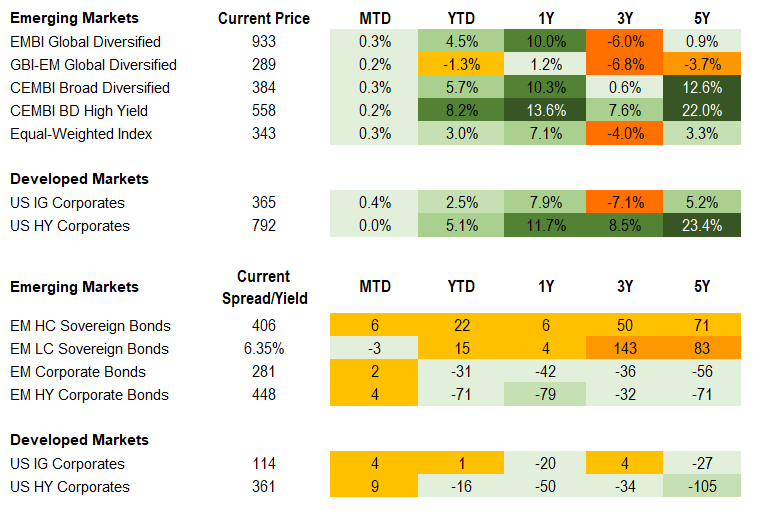
Equities
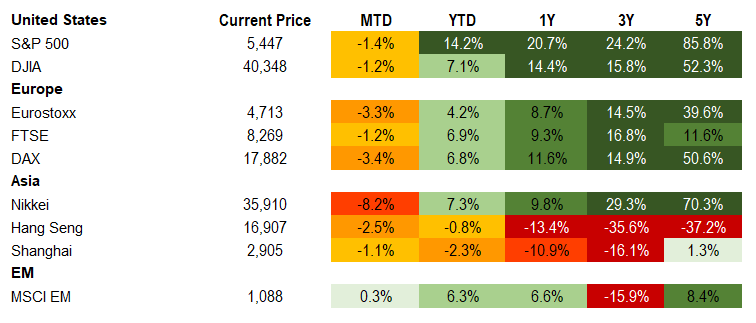
Commodities

Source for data tables: Bloomberg, JPMorgan, Gramercy. EM Fixed Income is represented by the following JPMorgan Indicies: EMBI Global, GBI-EM Global Diversified, CEMBI Broad Diversified and CEMBI Broad High Yield. DM Fixed Income is represented by the JPMorgan JULI Total Return Index and Domestic High Yield Index. Fixed Income, Equity and Commodity data is as of August 2, 2024 (early-morning).
Emerging Markets Weekly Highlights
Disputed Presidential Election plunges Venezuela into a period of significant political uncertainty
Event: Venezuela’s long anticipated Presidential Election took place on Sunday, July 28th. The main electoral authority (CNE) announced that incumbent President Nicolas Maduro was re-elected with 51% of the vote vs 44% for the opposition candidate Edmundo Gonzalez. However, the authorities have failed to present the constitutionally required election protocols to back up the announced results, citing a “cyber-attack from North Macedonia”. Meanwhile, the opposition obtained around 80% of election protocols from voting centers around the country, demonstrating that Edmundo Gozalez has overwhelmingly defeated Maduro, having collected around 7.1 million votes (67%) vs Maduro’s 3.2 million (30%).
Gramercy Commentary: Maria Corina Machado, the opposition’s leader, accused Maduro’s regime of perpetrating a monumental election fraud and proclaimed Mr. Edmundo Gonzalez as Venezuela’s President-elect. Violent street protests have erupted in the capital Caracas and across the country by opposition supporters not recognizing Mr. Maduro’s proclaimed re-election. The authorities have responded by dispatching police and National Guard units to repress the crowds and arresting hundreds of protestors, including some prominent opposition figures. The army, whose top Commander General, Vladimir Padrino Lopez, has thus far strongly endorsed the official results and Mr. Maduro’s retaining power, has remained in the barracks. The region has responded with strong condemnation: neighboring countries have broken off relationships, deemed the election fraudulent and/or withheld recognition until the dictatorship produces official results. The key external stakeholders on Venezuela—the United States, EU, Brazil, Colombia, and Mexico—have urged the authorities to produce all election protocols so that results can be verified. This has not occurred at the time of writing. Meanwhile, the Carter Center that had election observers on the ground released a statement that “Venezuela’s presidential election cannot be considered democratic”. In that context, we think the pressure for more forceful condemnation of Maduro’s actions is likely to increase in coming days. Going forward, the combination of domestic pressure (via street protests) and international pressure/diplomatic efforts will determine the trajectory in which this new phase of Venezuela’s political crisis will evolve. One scenario we are working with is for the regime to cling to power in the near-term, but likely grow progressively weaker, which could open the door for negotiations and some sort of power-sharing arrangement down the road. Other scenarios include a collapse of the regime under pressure by street protestors, many of whom come from areas/neighborhoods that have historically supported Maduro, and/or a shift in allegiance by the armed forces, which for the time being appears unlikely. An internal transition to a different leading figure within Chavismo is also among the possible scenarios.
Egypt receives $820mm IMF disbursement
Event: The IMF executive Board completed its third review of Egypt’s Extended Fund Facility and disbursed $820mm after a brief delay. The press release commended the authorities’ recent efforts to restore macroeconomic stability with a gradual reduction in inflationary pressures, elimination of foreign exchange shortages and fiscal consolidation. The Fund emphasized that the flexible exchange rate regime remains a cornerstone of the program. Continuation of appropriate macroeconomic policies is critical particularly in the context of risks related to ongoing regional conflicts.
Gramercy Commentary: The successful review with only moderate delay on the back of last month’s cabinet changes is constructive. The new Finance Minister, Ahmed Kouchouk, is well known to investors and the IMF from his role as Deputy and thus has had limited market impact. Going forward, key areas of focus will be management of the ongoing electricity shortages, monetary policy and the scope of FX flexibility and any further use of $35bn UAE or privatization inflows to reduce external debt, which declined by just over $14bn in the first half of the year.
Paraguay upgraded to investment grade
Event: Moody’s lifted its ratings of Paraguay 1-notch to Baa3 from Ba1 on the back of robust growth, institutional reforms, infrastructure investment and improved infrastructure bottlenecks while largely preserving the government’s fiscal position and diversifying its funding base.
Gramercy Commentary: The Moody’s upgrade, along with prospects for positive rating action from other agencies over time and policy backing under the PCI (Policy Coordination Instrument) with the IMF, should help to keep spreads well-anchored. The Government has continued solid execution of macroeconomic policy and reforms under the PCI as per the third review completed last month. Looking ahead, on the fiscal front, the IMF continues to encourage efforts to boost Paraguay’s still low tax base to help rebuild buffers and stabilize the financial position of the public pension funds while furthering efforts on climate-related reforms. The agreement reached with Brazil on the Itaipu Dam in May is estimated to increase revenues by $320mm a year, helping to further fund investments and social spending.
Emerging Markets Technicals
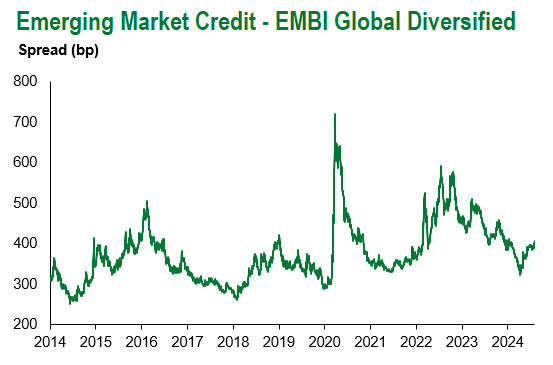
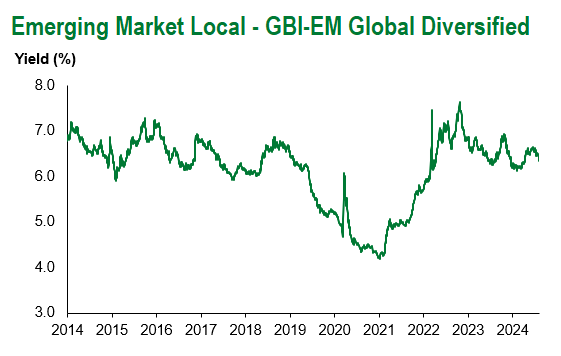
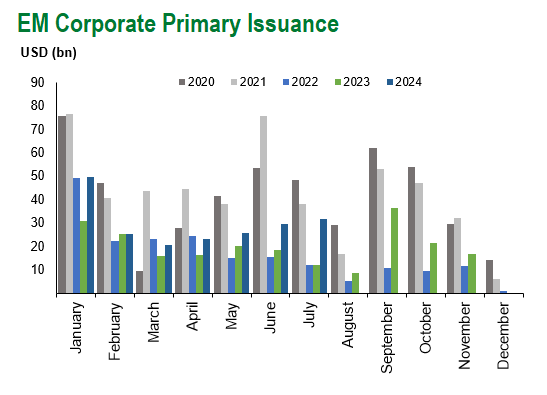
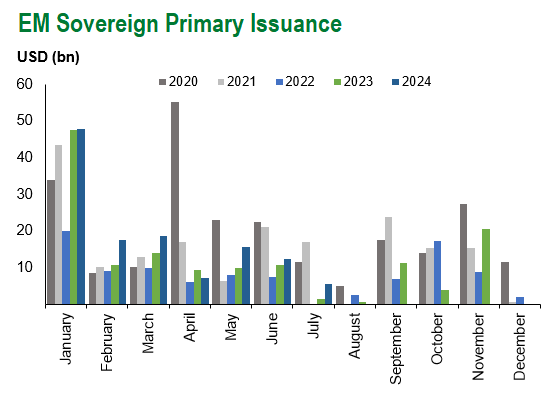
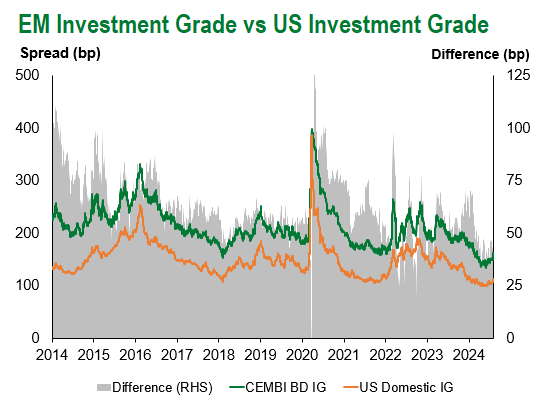
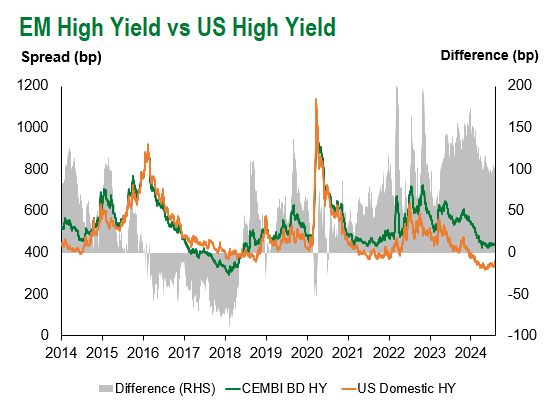
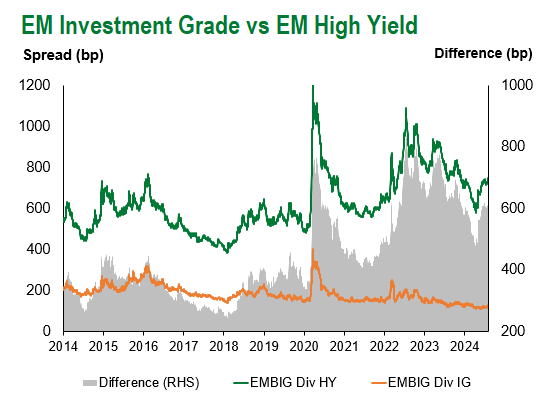
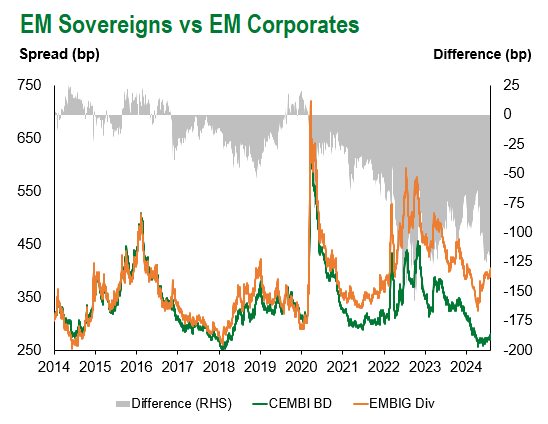
Emerging Markets Flows
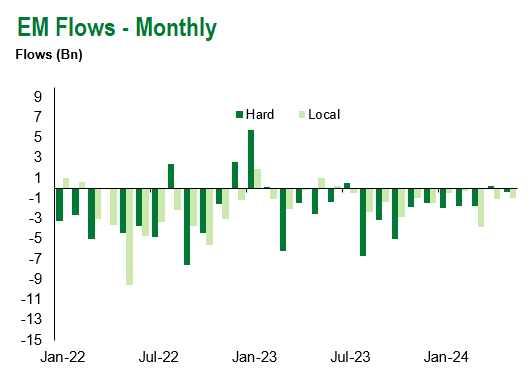
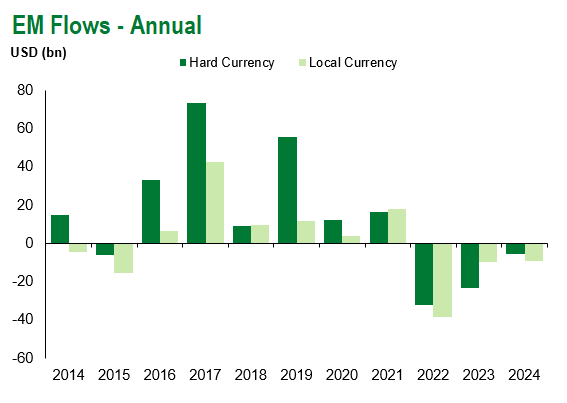
Source for graphs: Bloomberg, JPMorgan, Gramercy. As of August 2, 2024.
For questions, please contact:
Kathryn Exum, CFA ESG, Director, Co-Head of Sovereign Research, [email protected]
Petar Atanasov, Director, Co-Head of Sovereign Research, [email protected]
James Barry, Director, Deputy Portfolio Manager, [email protected]
This document is for informational purposes only. The information presented is not intended to be relied upon as a forecast, research or investment advice, and is not a recommendation, offer or solicitation to buy or sell any securities or to adopt any investment strategy. Gramercy may have current investment positions in the securities or sovereigns mentioned above. The information and opinions contained in this paper are as of the date of initial publication, derived from proprietary and nonproprietary sources deemed by Gramercy to be reliable, are not necessarily all-inclusive and are not guaranteed as to accuracy. This paper may contain “forward-looking” information that is not purely historical in nature. Such information may include, among other things, projections and forecasts. There is no guarantee that any forecasts made will come to pass. Reliance upon information in this paper is at the sole discretion of the reader. You should not rely on this presentation as the basis upon which to make an investment decision. Investment involves risk. There can be no assurance that investment objectives will be achieved. Investors must be prepared to bear the risk of a total loss of their investment. These risks are often heightened for investments in emerging/developing markets or smaller capital markets. International investing involves risks, including risks related to foreign currency, limited liquidity, less government regulation, and the possibility of substantial volatility due to adverse political, economic or other developments. References to any indices are for informational and general comparative purposes only. The performance data of various indices mentioned in this update are updated and released on a periodic basis before finalization. The performance data of various indices presented herein was current as of the date of the presentation. Please refer to data returns of the separate indices if you desire additional or updated information. Indices are unmanaged, and their performance results do not reflect the impact of fees, expenses, or taxes that may be incurred through an investment with Gramercy. Returns for indices assume dividend reinvestment. An investment cannot be made directly in an index. Accordingly, comparing results shown to those of such indices may be of limited use. The information provided herein is neither tax nor legal advice. Investors should speak to their tax professional for specific information regarding their tax situation.
